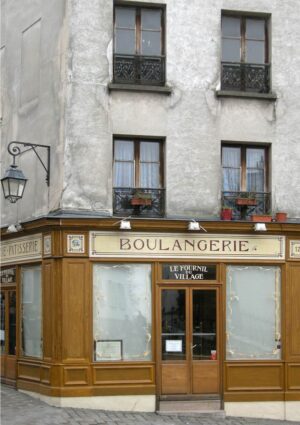Here is a simple Boulangerie greeting card for every day featuring a romantic boulangerie. Above the door is the painted inscription, Le Fournil de Village.
To be entitled to be called a boulangerie in France, the bakery must bake bread on the premises.
That means there must be a fournil on the premises. A fournil is an oven, usually located in the room where the baker works with his or her dough.
From this we can see that a boulangerie is the whole of the premises where the bread is sold.
Which kind of begs the question as to why the Fournil de Village appears above the door of this shop, because the very word boulangerie encompasses it. Still, no harm in driving home the point, eh?
Baguettes and Pain de Campagne
To be boulanger(masculine) or a boulangère(feminine) a baker in France must master the art of working with warm dough. He or she must master the technique of making it rise to give a bread full of large holes as in a baguette or smaller holes as in pain de campagne.
A boulangerie may also sell pâtisseries and viennoiseries, but their main business will be in baking and selling traditional French breads, such as baguettes and pain de campagne. That said, many shops also have a sandwich service, sell snacks, have a breakfast area and sometimes even a post office. One must move with the times.
Baguettes are long and thin, with a crust that snaps and a dough that is full of large holes. Pain de campagne has a thick crust and is a bread of the people – a bread without pretensions, honest and a mongrel mix of different flours.
Ah, bread. How about a simple rye and wheat pain au levain (a sourdough bread)?
The Origin of Boulangerie
The etymology of the word boulangerie is interesting because of course, the French word for bread is pain. And that word bears no resemblance to boulangerie. So where did it come from?
The word oulangerie means ‘ball’ and also ‘bun’ and its meaning can be traced back to an even older word meaning to ‘swell’ or ‘inflate’. So now the connection and the derivation are easy to understand. Except where did the word pain come from?
Pain is Old French, and before that from Latin pānis, with a possible connection to a proto-Indian word peh, meaning to feed, or to graze. And that fits, because bread is a staple – pain quotidian – our daily bread.
If you would like the greeting card that is featured in the image at the top of this article, click on it and it will take right to the product page to purchase it.
